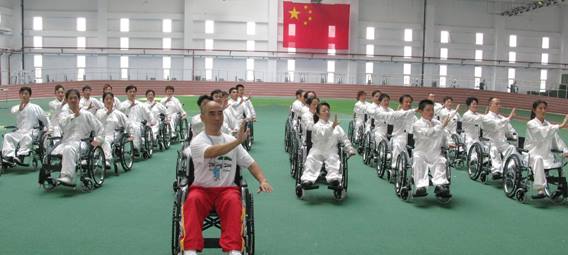Articles
Helping
You to Heal Your Disabilities
Practitioners and patients in China
practicing the new positive Tai Ji movements for people with severe physical
and emotional challenges.
It is no secret
that the body requires movement to assist with circulation for the muscles and
organs. Many people who are in
wheelchairs or otherwise physically challenged believe that their disabilities
cannot improve, and that they will be suffering for the remainder of their
lives.
Dr. Zibin Guo, a
trained medical anthropologist with many years of training and teaching
experience with Tai Ji (or Tai Chi), a form of Chinese traditional healing arts
had believed that a modified form of Tai Ji practice that could be effectively
utilized by people with various physical and mental challenges. He had worked
with many people in wheelchairs and knew the importance of movement to provide
nourishment and healing for the body.
In 2005, Dr. Guo
made a proposal of promoting wheelchair Tai Ji during the 2008 Beijing
Paralympics to China Federation for People with Disabilities and the Beijing
2008 Paralympics Committee. The proposal was seen as a potentially effective
way of improving the general physical and emotional health of such people. The
two organizations invited Dr. Guo to Beijing in October 2006 to conduct the
first wheelchair Tai Ji workshop for more than three dozen Tai Ji instructors
and professionals from all over China who work in the organizations that
provide services for people with disabilities.
This workshop
was first of its kind in China and it intended to promote the wheelchair Tai Ji
program that Dr. Guo had created. The feedback and support was immensely popular
and health practitioners thought that for the first time in the country’s history,
there was something that could actually work to improve the lives and physical
capacity of those with disabilities. So in the spring of 2007, China Federation
for People with Disabilities issued a policy statement to all provincial
organizations responsible for providing services for people with disabilities
to promote the wheelchair Tai Ji in their regions. The program has been met
with tremendous enthusiasm and widespread growth.
Major medical studies through the years have shown
that regular physical exercise is essential for people with severe physical
disabilities to maintain their health for muscles and organs, and to be able to
sometimes improve their health conditions. The same studies showed that people
with disabilities were less likely to engage in regular moderate physical
activity because of the following reasons:
- the
lack of suitable forms of exercise;
- limited
access and transportation to and from exercise facilities with appropriate
exercise equipment;
- lack
of adequate personnel who are trained willing to work with more severe
forms of physical challenges;
- affordability;
and
- the
lack of motivation due to the social isolation from their conditions.
Physical inactivity tends to make individuals
with severe physical challenges more reliant on medications to deal with their
health issues, and suffering from repeated bouts of additional related
problems. Rather than taking a proactive approach with their physical activities, they choose options that
further deteriorate their general health condition and cause additional secondary
health problems that can result in death.
Through the efforts of Dr. Guo and the
practitioners who support his work, the U.S. Department of Veterans Affairs has
given $120,000 in grant money to Guo to spread his special wheelchair tai chi
curriculum. He started in Chattanooga, Tennessee, and has expanded his class
offerings to Murfreesboro.
This idea of going beyond prescriptions — and especially beyond
opioids — in dealing with different sorts of pain and trauma has become a focus
of the VA nationally.
In Tennessee,
some 1/4th of all VA patients with an active
medical prescription were on opioids in 2012. That number is now down to 15
percent, which is a very promising and inspiring number. The program is how
being practiced in other states including Texas and Arizona, not only for the
VA, but for all patients with severe physical and emotional challenges.




Comments
Post a Comment
Please include your e-mail with your comments and a website address if you have one. Be respectful with your comments. We understand that there are many issues for physically, developmentally, and emotionally challenged people that are still not addressed universally, and we do want to hear about those. Inspiration always welcome. Thank you.